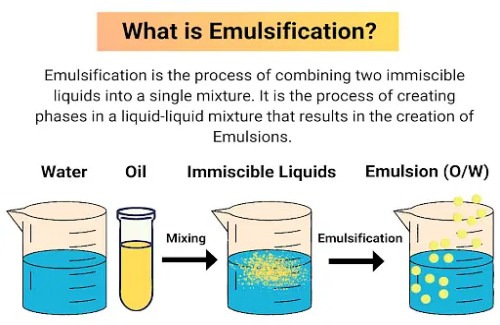Emulsifiers in Infant Formula: What Parents Should Know
Emulsifiers in Infant Formula: What Parents Should Know
Blog Article
Checking Out Different Sorts Of Emulsifiers and Their Applications Across Industries
Emulsifiers play a vital duty in numerous sectors, making certain items maintain their wanted texture and stability. You may be amazed to find the differences between natural and synthetic emulsifiers, each bringing unique advantages to the table.
What Are Emulsifiers?
Emulsifiers are essential materials that aid mix two immiscible fluids, like oil and water, producing a stable mix. You commonly encounter emulsifiers in everyday items, from salad dressings to lotions.
In food manufacturing, emulsifiers improve the mouthfeel and security of items, making them much more enjoyable. On the whole, understanding emulsifiers can help you value the scientific research behind the products you utilize daily, showcasing their importance in various markets.
Kinds of Emulsifiers: All-natural vs. Synthetic
When considering emulsifiers, it is essential to identify the difference between natural and synthetic alternatives. Natural emulsifiers, stemmed from plant or pet resources, typically interest those looking for healthier, a lot more eco-friendly products. Instances include lecithin from soybeans and beeswax, which can give stability in food and aesthetic formulations.

Selecting in between all-natural and artificial emulsifiers steams down to your specific needs. Eventually, understanding your demands will help you choose the best emulsifier for your task.

Mechanisms of Action: Exactly How Emulsifiers Job
Comprehending the distinctions between natural and artificial emulsifiers establishes the stage for checking out just how these substances function. Emulsifiers function by reducing the surface tension in between two immiscible fluids, like oil and water. They possess a hydrophilic (water-attracting) head and a hydrophobic (water-repelling) tail, allowing them to engage with both phases. When you blend oil and water, emulsifiers position themselves at the interface, supporting the combination.
As you stir, the emulsifiers create an obstacle around oil beads, avoiding them from coalescing. By understanding these devices, you can much better appreciate the vital function emulsifiers play in different applications, from cosmetics to pharmaceuticals, ensuring the wanted structure and stability in products you make use of every day.
Emulsifiers in the Food Market
In the food industry, around 80% of processed foods consist of emulsifiers, highlighting their vital function in boosting texture and security. These components assist mix oil and water, developing smooth, uniform items like salad dressings, sauces, and gelato. When you grab a container of mayonnaise or a container of delicious chocolate syrup, you're experiencing the magic of emulsifiers at work.
Usual emulsifiers like lecithin, mono- and diglycerides, and polysorbates aren't nearly preference-- they boost service life and avoid active ingredient splitting up. This implies your favorite foods stay fresher and maintain their attractive look.
You'll additionally find emulsifiers in baked products, where they add to moisture retention and crumb framework. By understanding the influence of emulsifiers, you can value just how they elevate your food experiences, making each bite not just delicious however additionally regular. So, next time you appreciate a velvety dip or a rich dessert, remember the unseen heroes at job!
Emulsifiers in Cosmetics and Personal Treatment Products
While you might believe of emulsifiers largely in food, they play a vital role in cosmetics and individual treatment items. These compounds aid blend water and oil, creating smooth, steady formulas in creams, lotions, and lotions. You'll find emulsifiers in moisturizers, where they guarantee even distribution of moistening ingredients, making them more efficient on your skin.
When you use make-up, emulsifiers assist attain the ideal structure, permitting items to slide on effortlessly. They also improve the rack life of items by protecting against separation, assuring you obtain one of the most out of your preferred things.
Usual emulsifiers in this market include glyceryl stearate and cetyl alcohol, which not just stabilize formulas yet additionally offer skin advantages. So, next time you grab a cream or foundation, bear in mind that emulsifiers are silently functioning behind the scenes to maintain your products reliable and delightful to utilize.
Emulsifiers in Pharmaceuticals
Emulsifiers play an essential role in drugs by making certain that energetic ingredients are evenly distributed within liquid recommended you read formulations. When you're establishing dental, topical, or injectable medications, you need emulsifiers to maintain mixes of oil and water, enhancing the bioavailability of the active compounds. This stability is vital for keeping the efficiency and security of the item throughout its life span.
You might come across several sorts of emulsifiers, like all-natural ones stemmed from plant resources or artificial options specifically made for targeted applications. Each type can click over here influence the appearance, absorption price, and total performance of the medicine.
Furthermore, emulsifiers can enhance the solubility of improperly water-soluble drugs, making them more healing. Consequently, you can create formulations that are much easier to carry out and more effective for patients - Emulsifiers. Comprehending the function of emulsifiers will certainly help you make informed selections in pharmaceutical development
Emulsifiers in Industrial Applications and Paints
When you take into consideration industrial applications and paints, emulsifiers end up being important for achieving the preferred uniformity and efficiency of items. They help stabilize mixtures of water and oils, protecting against separation and guaranteeing uniformity. In paint formulas, emulsifiers boost dispersion, permitting pigments to mix seamlessly and offering a smooth coating.
You'll find that different types of emulsifiers deal with certain requirements, such as enhancing bond, lowering surface stress, or boosting durability. In finishings, they help regulate thickness, making application easier and a lot more reliable.
Beyond paints, emulsifiers play a significant function in adhesives and sealants, adding to far better bonding and flexibility. Emulsifiers. By choosing the right emulsifier, you can significantly boost product top quality and performance, making your offerings more competitive on the useful content market. To sum up, emulsifiers are crucial for maximizing commercial applications, making certain that products satisfy the needs of consumers and market requirements alike
Regularly Asked Inquiries
Are Emulsifiers Safe for Intake in Food Products?
Yes, emulsifiers in foodstuff are typically risk-free for consumption. They're tested for safety and security and approved by regulative agencies. You can take pleasure in foods consisting of emulsifiers without stressing, as they boost appearance and security in your dishes.
Can Emulsifiers Cause Allergies in Some People?
Yes, emulsifiers can cause allergies in some individuals. If you're delicate to specific active ingredients, it's important to review labels carefully and speak with a healthcare specialist if you experience any kind of negative responses. Remain informed and risk-free!
Just How Do Emulsifiers Effect the Service Life of Products?
Emulsifiers enhance the life span of items by supporting combinations, protecting against separation. They aid maintain appearance and flavor, ensuring your things stay enticing and fresh for longer, ultimately minimizing waste and improving your overall experience.
Are There Vegan-Friendly Emulsifiers Available?
Yes, there are a lot of vegan-friendly emulsifiers readily available. You'll discover choices like soy lecithin, sunflower lecithin, and guar gum tissue, which work well in numerous recipes while maintaining your recipes plant-based and scrumptious.

What Are the Environmental Effects of Artificial Emulsifiers?
Synthetic emulsifiers can hurt environments with air pollution and bioaccumulation. They might interfere with aquatic life and add to soil destruction. You must consider all-natural alternatives to minimize these environmental impacts while keeping product performance.
Report this page